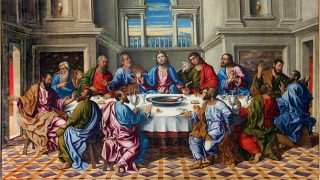
I WILL NOT LEAVE YOU DESOLATE
HOMILY FOR SIXTH SUNDAY OF EASTER, YEAR A. Readings: Acts 8:5-8, 14-17; Psalm 65: 1-7, 16, 20; 1 Peter 3:15-18 and John 14:15-21.
As we gradually approach the end of this beautiful season, the Church invites us to prepare our minds for the Lord’s Ascension into heaven that comes up on Thursday this week and prepares us for Pentecost. The reception of the Holy Spirit strengthens the Church in her evangelization of the good news. The readings indicate how we should prepare to receive the Holy Spirit, how the Holy Spirit sustains us in moments of persecution, how the Church calls down the Holy Spirit through the Sacraments and the doctrinal teaching of the Church on filoque.
We often prefer to think of God’s love as unconditional, but today’s gospel establishes two conditions for receiving the Father’s love: by keeping Christ’ commandment and loving him. The two conditions are interdependent or interwoven that Christ binds them together as if they are one. The liturgy brings to consciousness those with the mindset that “Only God can love me unconditionally.” It is a reminder to us that there is a condition attached to this love, which is to keep God’s commandment and to love him. As Christ said when he was about to ascend to his Father, “If you love me keep my commandments and I will ask the Father and he will give you another Counsellor, to be with you forever, …the Spirit of truth” (Jn 14:15-16).
The fear of abandonment is noticeable in the lives of the disciples. In view of this, God the Son assured them he will pray to God the Father and ask the giving of God the Holy Spirit to the believers to keep his commandments. Christ simply spoke of how the Persons in Trinity interact and work for the good of God’s people and the furtherance of His plan. The Holy Spirit has been present in the life of the Church ab inicio, it acts as a teacher and a reminder of all the teachings of Christ: “The Holy Spirit whom the Father will send in my name, he will teach you all things, and bring to your remembrance all that I have said to you” (v. 26). This also have a catechetical dimension as regard the historical controversy of the 11th century between Roman Catholic and Orthodox Christians, debating on the clause if the Holy Spirit proceeds from ‘the Father alone’ or from ‘the Father and the Son’ as we have in the ‘filoque’ (the Latin form for “from the Son”) as in the Nicene Creed.
The New Testament offers two perspectives of the Holy Spirit. The Pneuma or Pneumatos (Spirit) which was used at the baptism of Christ and the Parakletos used in today’s gospel as confirmation of the Spirit and could mean advocate, Counselor, Comforter and Intercessor. Christ tells Nicodemus, “Unless one is born of water and of the Holy Spirit (Pneumatos), he cannot enter the Kingdom of heaven” (Jn 3:34); God is Pneuma (Spirit), the Spirit who gives life (6:63). In chapter 14 of John’s gospel, the tone of the Spirit shift from Pneuma to Parakletos. While the Orthodox Christians hold unto Jn 15:26 that the Holy Spirit ‘proceeds from the Father alone’, the Roman Catholic agrees with them but cannot separate the Father from the Son, holding unto the proper words of Christ in today’s gospel, “The Holy Spirit, whom the Father will send in my name…”( Jn 14:26). Christ has earlier affirmed, “I and the Father are one” (Jn 10:30). Hence, the western expansion of the clause, ‘who proceeds from the Father and the Son’ (filoque), could be justified by the fact that the Son as well as the Father is said to send the Spirit. Put differently, the Holy Spirit proceeds from the Father and the Son.
Christ also gave the disciples an assurance of his presence with them, “I will not leave you desolate” (Jn 14:18). In some other translation, it says, “I will not leave you orphan.” The fear of the disciples is that, after his ascension, everything will be over. They will be like children without parents or students without teacher. This was not the case because for an orphan the parents are dead, but the Spirit Christ promised is alive. An orphan is left alone, but the Spirit draws us close to God’s presence; an orphan has lost his/her provider, but the Spirit provides all things; an orphan maybe left without instruction but the Spirit teaches us all things and an orphan may have no defender, but the Spirit is our protector.
The first reading presents to us how the Holy Spirit worked through Philip, who proclaimed Christ to the city of Samaria and the people gave heed to what he said. Through Philip they received Baptism (the Pneuma), later Peter and John were sent to administer the Sacrament of Confirmation on them: “Peter and John who came down and prayed for them that they might receive the Holy Spirit (Parakletos); for the Spirit had not yet fallen on any of them, but they had only to be baptized in the name of the Lord” (Acts 8:14-17). On this day, peter confirms his episcopal function by laying hands upon the new converts. One may ask why did Philip not confirm them? At this point, what Philip did was in line with the teaching of the Catechism of the Catholic Church, which says, “The ordinary minister of the Sacrament of Confirmation is the bishop. If the need arises, He may grant the faculty to priests, although, it is fitting that he confers it himself mindful that the celebration of Confirmation has been temporarily separated from baptism for this reason. Bishops are the successors of the apostles” (CCC 1313), of which, Peter was the Chief Shepherd among the Apostles. “They laid hands on them and they received the Holy Spirit” (Acts 8:17). A reminder not to disvalue the power that comes from the clergy laying hands on the faithful. As the people of Samaria needed the Holy Spirit, we also need it.
Conclusively, Peter in the second reading urges us to be prepared at all times in defending our faith, which is the hallmark of Communication Week that begins today till 21st May. We cannot do this without first, equipping ourselves. Hence, he admonished us to treat with respect those who despise the Gospel we preach and reminds us of the animating power of the Holy Spirit in the life of Christ, “In the body he was put to death, in the Spirit he was raised to life” (1Peter 3:18). Invariably, it is the Spirit of God that gives us life.
Happy Sunday!
Fr. Ken Dogbo, OSJ










